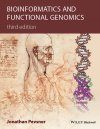Textbook
By: Jonathan Pevsner(Author)
1124 pages, colour photos, colour illustrations, colour tables
![Bioinformatics and Functional Genomics Bioinformatics and Functional Genomics]()
Click to have a closer look
About this book
Contents
Customer reviews
Biography
Related titles
Recommended titles
About this book
Bioinformatics and Functional Genomics, Third Edition is the latest revision of this bestselling and indispensible text book. Thoroughly updated to encompass the latest advances in the field the book retains its broad and accessible approach.
Divided into three parts Bioinformatics and Functional Genomics deals first with bioinformatics, the use of computer databases and computer algorithms in the study of proteins and genes. The first section includes sequence alignment, database searches and phylogeny. The second section of the book focuses on functional genomics and includes approaches such as gene expression profiling and proteomics that are used to study cellular function. The final part of the book deals with genomics which is the study of the collection of DNA that comprises an organism, using the tools of bioinformatics.
Bioinformatics and Functional Genomics, Third Edition will serve as an excellent single-source textbook for advanced undergraduate and beginning graduate-level courses in the biological sciences and computer sciences. It will also provide an essential resource for biologists in a broad variety of disciplines who use the tools of bioinformatics and genomics to study particular research problems; bioinformaticists and computer scientists who develop computer algorithms and databases; and medical researchers and clinicians who want to understand the genomic basis of viral, bacterial, parasitic, or other diseases.
Contents
Part I: Bioinformatics: Analyzing DNA, RNA, and protein sequences
Chapter 1. Introduction
Chapter 2. Access to information
Chapter 3. Pairwise alignment
Chapter 4. BLAST
Chapter 5. Advanced BLAST
Chapter 6. Multiple sequence alignment
Chapter 7. Molecular phylogeny and evolution
Part II: Functional genomics: Bioinformatics from DNA to RNA to protein
Chapter 8. DNA: The eukaryotic chromosome
Chapter 9. DNA analysis: microarrays and next-generation sequencing
Chapter 10. RNA
Chapter 11. RNA analysis: microarrays and next-generation sequencing
Chapter 12. Proteomics
Chapter 13. Protein structure
Chapter 14. Functional genomics
Part III: Genomics
Chapter 15. The tree of life
Chapter 16. Viruses
Chapter 17. Bacteria and archaea
Chapter 18. The fungi
Chapter 19. Eukaryotic genomes
Chapter 20. The human genome
Chapter 21. Human disease
Appendix I: Solutions to quizzes
Appendix II: Glossary
Bibliography
Index (general)
Index (names)
Customer Reviews
Biography
Jonathan Pevsner, PhD, is a Professor in the Department of Neurology at Kennedy Krieger Institute, an internationally recognized institution dedicated to improving the lives of children with neurodevelopmental disorders. He holds a primary faculty appointment as Professor in the Department of Psychiatry and Behavioral Sciences (Johns Hopkins University School of Medicine). He holds joint or secondary appointments in the Department of Neuroscience, the Institute of Genetic Medicine, and the Division of Health Sciences Informatics (Johns Hopkins School of Medicine), and the Department of Molecular Microbiology and Immunology (Johns Hopkins Bloomberg School of Public Health). He has taught bioinformatics courses since 2000 at the Johns Hopkins School of Medicine, and was awarded Teacher of the Year honors by the Graduate Student Association in both 2001 and 2006, the Professors’ Award for Excellence in Teaching awarded by the medical faculty (2003), Teacher of the Year (Advanced Academic Programs, 2009), and Teaching Excellence Award in the Johns Hopkins Bloomberg School of Public Health (2011). In 2013 his lab used whole genome sequencing and reported a mutation that causes a rare disease, Sturge-Weber syndrome, as well as a commonly occurring port-wine stain birthmark.




































